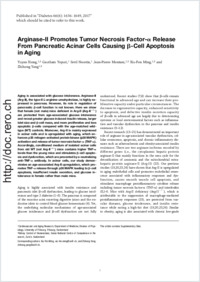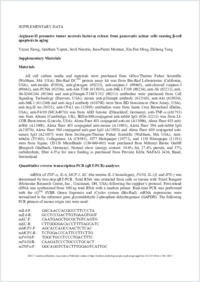Arginase-II promotes tumor necrosis Factor-α release from pancreatic acinar cells causing β-cell apoptosis in aging
- Xiong, Yuyan Cardiovascular and Aging Research, Department of Medicine, Division of Physiology, University of Fribourg, Switzerland - Kidney Control of Homeostasis, Swiss National Centre of Competence in Research, Zurich, Switzerland
- Yepuri, Gautham Cardiovascular and Aging Research, Department of Medicine, Division of Physiology, University of Fribourg, Switzerland
- Necetin, Sevil Cardiovascular and Aging Research, Department of Medicine, Division of Physiology, University of Fribourg, Switzerland
- Montani, Jean-Pierre Cardiovascular and Aging Research, Department of Medicine, Division of Physiology, University of Fribourg, Switzerland - Kidney Control of Homeostasis, Swiss National Centre of Competence in Research, Zurich, Switzerland
- Ming, Xiu-Fen Cardiovascular and Aging Research, Department of Medicine, Division of Physiology, University of Fribourg, Switzerland - Kidney Control of Homeostasis, Swiss National Centre of Competence in Research, Zurich, Switzerland
- Yang, Zhihong Cardiovascular and Aging Research, Department of Medicine, Division of Physiology, University of Fribourg, Switzerland - Kidney Control of Homeostasis, Swiss National Centre of Competence in Research, Zurich, Switzerland
-
01.06.2017
Published in:
- Diabetes. - 2017, vol. 66, no. 6, p. 1636–1649
English
Aging is associated with glucose intolerance. Arginase-II (Arg-II), the type-II L-arginine- ureahydrolase, is highly expressed in pancreas. However, its role in regulation of pancreatic β-cell function is not known. Here we show that female (not male) mice deficient in Arg-II (Arg-II−/−) are protected from age-associated glucose intolerance and reveal greater glucose induced-insulin release, larger islet size and β-cell mass, and more proliferative and less apoptotic β-cells compared with the age-matched wild- type (WT) controls. Moreover, Arg-II is mainly expressed in acinar cells and is upregulated with aging, which enhances p38 mitogen-activated protein kinase (p38 MAPK) activation and release of tumor necrosis factor-α (TNF-α). Accordingly, conditioned medium of isolated acinar cells from old WT (not Arg-II−/−) mice contains higher TNF-α levels than the young mice and stimulates β-cell apoptosis and dysfunction, which are prevented by a neutralizing anti–TNF-α antibody. In acinar cells, our study demonstrates an age-associated Arg-II upregulation, which promotes TNF-α release through p38 MAPK leading to β-cell apoptosis, insufficient insulin secretion, and glucose intolerance in female rather than male mice.
- Faculty
- Faculté des sciences et de médecine
- Department
- Département de Médecine
- Language
-
- English
- Classification
- Biological sciences
- License
-
License undefined
- Identifiers
-
- RERO DOC 288985
- DOI 10.2337/db16-1190
- Persistent URL
- https://folia.unifr.ch/unifr/documents/305554
Other files
Statistics
Document views: 112
File downloads:
- pdf: 195
- Supplementary material: 150

